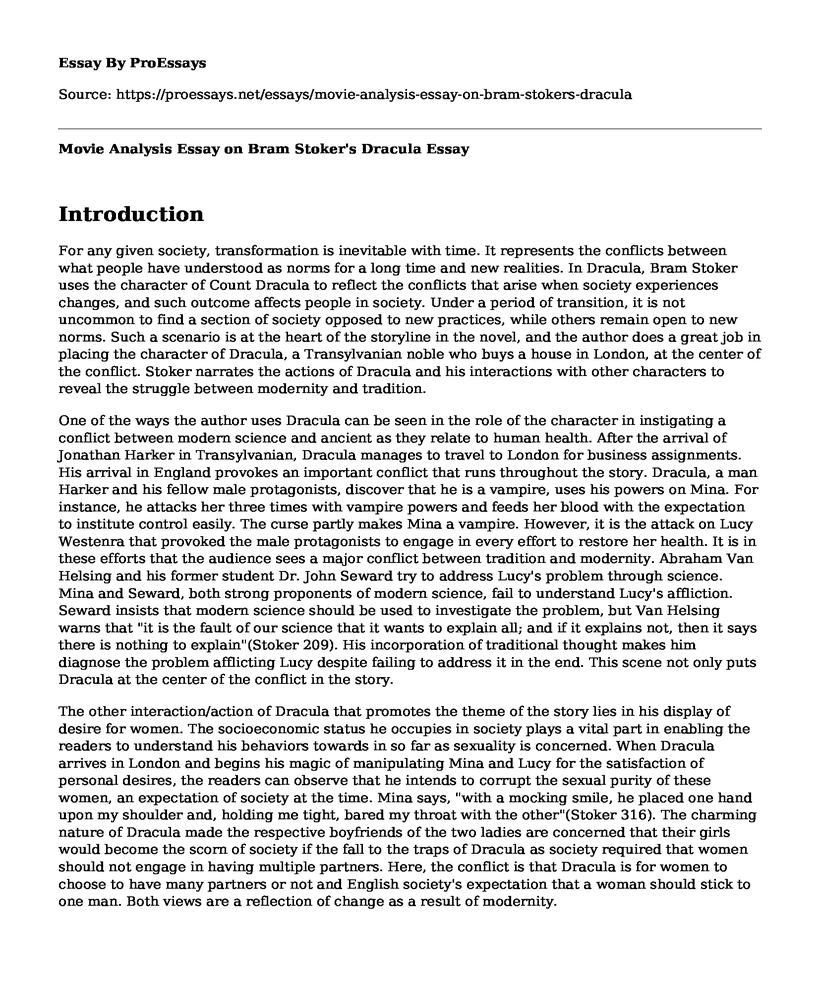Introduction
For any given society, transformation is inevitable with time. It represents the conflicts between what people have understood as norms for a long time and new realities. In Dracula, Bram Stoker uses the character of Count Dracula to reflect the conflicts that arise when society experiences changes, and such outcome affects people in society. Under a period of transition, it is not uncommon to find a section of society opposed to new practices, while others remain open to new norms. Such a scenario is at the heart of the storyline in the novel, and the author does a great job in placing the character of Dracula, a Transylvanian noble who buys a house in London, at the center of the conflict. Stoker narrates the actions of Dracula and his interactions with other characters to reveal the struggle between modernity and tradition.
One of the ways the author uses Dracula can be seen in the role of the character in instigating a conflict between modern science and ancient as they relate to human health. After the arrival of Jonathan Harker in Transylvanian, Dracula manages to travel to London for business assignments. His arrival in England provokes an important conflict that runs throughout the story. Dracula, a man Harker and his fellow male protagonists, discover that he is a vampire, uses his powers on Mina. For instance, he attacks her three times with vampire powers and feeds her blood with the expectation to institute control easily. The curse partly makes Mina a vampire. However, it is the attack on Lucy Westenra that provoked the male protagonists to engage in every effort to restore her health. It is in these efforts that the audience sees a major conflict between tradition and modernity. Abraham Van Helsing and his former student Dr. John Seward try to address Lucy's problem through science. Mina and Seward, both strong proponents of modern science, fail to understand Lucy's affliction. Seward insists that modern science should be used to investigate the problem, but Van Helsing warns that "it is the fault of our science that it wants to explain all; and if it explains not, then it says there is nothing to explain"(Stoker 209). His incorporation of traditional thought makes him diagnose the problem afflicting Lucy despite failing to address it in the end. This scene not only puts Dracula at the center of the conflict in the story.
The other interaction/action of Dracula that promotes the theme of the story lies in his display of desire for women. The socioeconomic status he occupies in society plays a vital part in enabling the readers to understand his behaviors towards in so far as sexuality is concerned. When Dracula arrives in London and begins his magic of manipulating Mina and Lucy for the satisfaction of personal desires, the readers can observe that he intends to corrupt the sexual purity of these women, an expectation of society at the time. Mina says, "with a mocking smile, he placed one hand upon my shoulder and, holding me tight, bared my throat with the other"(Stoker 316). The charming nature of Dracula made the respective boyfriends of the two ladies are concerned that their girls would become the scorn of society if the fall to the traps of Dracula as society required that women should not engage in having multiple partners. Here, the conflict is that Dracula is for women to choose to have many partners or not and English society's expectation that a woman should stick to one man. Both views are a reflection of change as a result of modernity.
Conclusion
In conclusion, the character of Dracula successfully conveys the conflict between modernity and tradition in the novel. Stoker uses medical science to show how characters differ in their interpretations of the causes of health problems, as seen in the attempts Seward and Helsing to diagnose the health problem afflicting Lucy. The other conflict is seen in the attitudes of Dracula towards the sexuality of women in England and how the English society perceived promiscuity among women. The two perspectives contrast each other. Overall, Stoker has shown that modernity can be embraced exist if history is acknowledged.
Cite this page
Movie Analysis Essay on Bram Stoker's Dracula. (2023, Mar 16). Retrieved from https://proessays.net/essays/movie-analysis-essay-on-bram-stokers-dracula
If you are the original author of this essay and no longer wish to have it published on the ProEssays website, please click below to request its removal:
- Analysis of Speeches from Films
- Grammar in Context Article Review
- Left Wing Media Bias Essay Example
- Essay on Zombies: Reawakened Corpses, Horror Movies, & The Girl with All Gifts
- Business Letters vs Social Media Posts - Essay Sample
- Essay Example on Smartphones: Revolutionizing Communication and Convenience
- Essay Example on How the Plot of a Short Story Influences its Popularity







